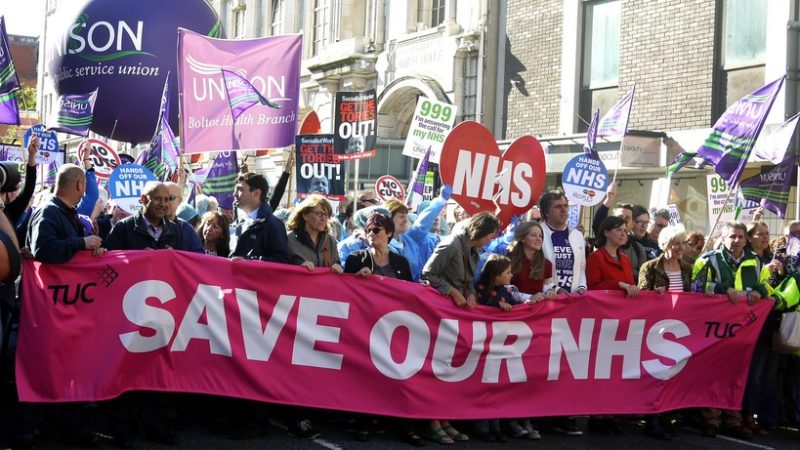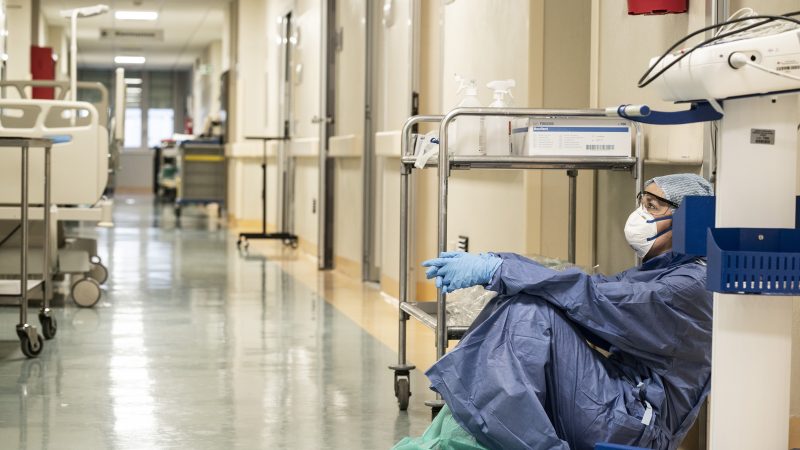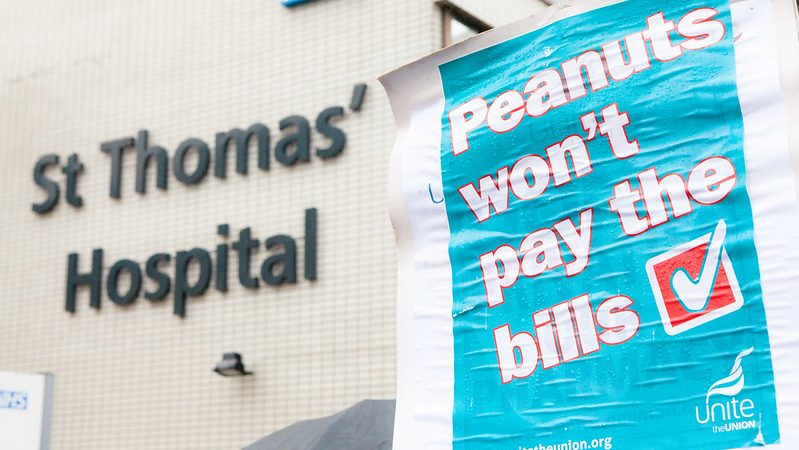‘Heartbreaking’: Shocking decline in public satisfaction with NHS under Tories
'The NHS isn't failing, it's being failed. What an appalling act of state vandalism’

Public satisfaction with the NHS is at its lowest ever level, plunging for the first time in the 41-year history of the survey to show less than a quarter of people are satisfied with the way the health service is currently running.
Compared to 2010 when 70% of the public were satisfied with the NHS, the latest survey findings lay bare what 14 years of a Tory government stripping funds and resources from the NHS has had.
Campaign group Keep Our NHS Public has called it “an appalling act of state vandalism” commenting that the NHS “isn’t failing, it’s being failed”.
NHS workers have expressed heartbreak over the shocking decline in public satisfaction for the service under the Tories while unions have called for immediate action to address the staffing crisis.
One palliative care doctor wrote on X: “14 years of Tory government understaffing, underfunding & private sector outsourcing have trashed the NHS into a travesty of the service we want to give you.
“It is heartbreaking & so disgustingly wrong.”
A NHS Medical consultant and health policy editor wrote: “The public are right to be dissatisfied with the NHS right now. It’s a shadow of its former self. Staff are completely wiped out. There isn’t enough space to treat patients. Roofs are falling down. And the govt solution is to bung their mates in AI and tech a few billion quid.”
Since 2020 satisfaction has fallen by 29%, with waiting times and staff shortages the biggest concerns, while the public was least satisfied with A&E and dentistry.
Pat Cullen, leader of the Royal College of Nursing (RCN) said nurses would respond to the survey with mixed emotions of both ‘sorrow’ and ‘hope’ – hope that the public shares their view that ‘enough is enough’.
Making care services and the NHS the central issue of the general election is what voters must now do, Cullen urged.
“It did not have to be this way and it did not start with the pandemic either,” the general secretary responded. “An NHS that was once a world-leader is now treating patients in corridors, doorways, and store cupboards.”
“Nurses are exhausting themselves caring for unsafe numbers of patients at a time as they are short of tens of thousands of colleagues. The status quo has become professionally intolerable for many.”
Support for the fundamental principles of the NHS remain extremely high, with 91% of people believing it should remain free of charge when people need it, and 82% said it should be funded primarily from taxation and available to everyone, regardless of income.
The UK’s largest union Unison blamed the government for patient suffering and called on ministers to hold immediate pay talks for health workers, in order to address the NHS staffing crisis.
“The NHS cannot provide the quality care people need until the staffing crisis is addressed. Patients are suffering because of government inaction,” said Unison’s head of health Helga Pile.
“Low pay and burnout are to blame for nurses, paramedics and other health workers quitting the service. When the minimum wage increases next week, the lowest paid NHS staff will only be earning one pence an hour above the legal minimum.
“It’s not surprising they’re leaving for jobs elsewhere when supermarkets are paying much better hourly rates.”
This chart by the Kings Fund highlights just how steep the depressing fall in public satisfaction with the NHS has been under the Tories, and how it compares to public sentiment since 1983

Hannah Davenport is news reporter at Left Foot Forward, focusing on trade unions and environmental issues
NHS nurses are effectively working for free, a new study finds
‘Ministers who once seemed glad to applaud NHS staff should reflect on this terrible state of affairs.’

Nurses’ real-term wages have fallen so low, they are essentially working for free. This was the shocking finding of a new study by London Economics.
The comprehensive analysis of pay awards shows that between 2010/11 and 2023/24, a typical, experienced nurse had their pay cut in real terms by 25 percent. The cuts have been so severe since the Tories came into power that hundreds of thousands of nurses are effectively working five days a month for free. In England, 248,500 (74 percent) of the NHS’s 336,900 nurses are in pay bands 5 and 6, earning between £28k and £42k each year.
A 5 percent NHS pay rise last year was rejected in a ballot by the Royal College of Nursing (RCN) but the government imposed the below-inflation award for the 2023/24 financial year anyway.
The London Economic figures come alongside damning findings from a cost-of-living survey of almost 11,000 nursing staff. The survey shows more than half – 52 percent – of nursing staff say they are likely or very likely to quit nursing in the next five years due to low pay and cost of living pressures. Over two thirds – 68 percent – admitted to rationing gas and electricity last winter.
Professor Pat Cullen, RCN general secretary and chief executive, said that analysis exposes the scale of the “government’s sustained attack on nursing.”
“Over a decade of below inflation pay offers, followed last year by the lowest award in the entire public sector, have caused hardship and forced thousands to consider quitting altogether.
“Today, nursing staff are rationing electricity and gas with financial pressures pushing four in ten into a state of mental distress. Pay has been devalued so much that they are effectively working 5 days or more for free each month. Ministers who once seemed glad to applaud NHS staff should reflect on this terrible state of affairs.”
Cullen warns that when nursing pay is deliberately undermined in this way, so too is patient care.
“There are tens of thousands of nurse vacancies across England’s NHS and yet our most experienced nurses are being forced out of the profession – just when the health service needs them most.”
In a formal submission to the NHS Pay Review Body for 2024/25, the union called for a sizeable lump sum on top of a substantial above inflation pay rise.
“Ministers must commit to a substantial pay rise for every member of nursing staff. That’s how to begin delivering pay justice for a profession so routinely undervalued. If they fall short once again, they will be exposing tens of thousands to further hardship and exacerbate an already dangerous staffing crisis,” the RCN general secretary added.
Thousands of foreign nurses are abandoning Britain to find work abroad
Gabrielle Pickard-Whitehead
‘It’s no joke that nurse pay in the UK is joint bottom of 35 OECD countries.’

Around 9,000 NHS nurses are leaving the UK each year to work in other countries in search of better paid jobs.
Between 2021-2022 and 2022-2023, the number of UK-registered nurses moving overseas for jobs doubled to a record 12,000. Since before the Covid-19 pandemic, the number of nurses leaving Britain to find work elsewhere has increased fourfold.
The research, carried out by the Health Foundation, found that the majority of nurses quitting the UK are heading to the United States, Australia and New Zealand, where the nursing profession is paid much more generously. Sometimes the salary in these countries is double what UK-registered nurses receive.
The health service is hugely reliant on recruiting nurses from abroad, and the damning findings come as the NHS is already struggling to fill around 40,000 nurse vacancies.
Fears have been made that the UK is acting as a ‘stepping stone’ for many nurses. Elaine Kelly, assistant director at the Health Foundation’s research centre and co-author of the report, said that, with an acute nursing shortage and so many overseas nurses quitting Britain, the NHS needs to be “a more attractive place to work for all nurses, regardless of where they were trained,” if it is to avoid “becoming a stepping stone to careers elsewhere.”
Kelly added that the situation is especially worrying given that it costs the NHS about £10,000 to replace each foreign recruit who moves abroad.
The Royal College of Nursing (RCN) said the rising exodus of overseas-trained nurses is because of the drop of pay in the profession since 2010.
Prof Pat Cullen, chief executive and general secretary of the RCN, said the situation is “deeply worrying.”
“The recruitment of domestic nurses is collapsing, and services are gripped by workforce shortages.
“With patient needs already going unmet, the prospect of losing more of our international colleagues doesn’t bear thinking about.
“The reality is that sustained attacks on pay and poor working conditions are leaving the UK’s healthcare services unable to compete on the world stage. International nurses, like all nurses, have every right to choose to work in countries that better value their skills and expertise. It’s no joke that nurse pay in the UK is joint bottom of 35 OECD countries.”
Gabrielle Pickard-Whitehead is a contributing editor to Left Foot Forward








